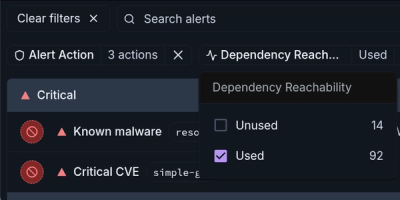
Security News
CISA Rebuffs Funding Concerns as CVE Foundation Draws Criticism
CISA denies CVE funding issues amid backlash over a new CVE foundation formed by board members, raising concerns about transparency and program governance.
Lightweight FastAPI dependencies and authenticator that uses Flask session cookies for access control.
Lightweight FastAPI dependencies and authenticator that uses Flask session cookies for access control.
Why would you want to base your FastAPI application's authentication on session cookies created by a Flask application?
Well, imagine that you have a Flask application that handles authentication (probably with flask-login) among other tasks and you'd like to use FastAPI for some new routes, or maybe you just want to offload some work from Flask to FastAPI for convenience or performance reasons. In such a scenario, you probably don't want the client to authenticate at both server applications. What you can do instead is put both server applications behind a reverse proxy, let Flask handle authentication and do its job as before, and use Flask's session cookies for authentication in your FastAPI application with this library.
You can install the library from PyPI with pip install fastapi-flask-auth.
You will also need to install a Flask session decoder. If you're looking for a lightweight, zero-dependency decoder, give flask-session-decoder a try. You can do this manually with pip install flask-session-decoder or you can install fastapi-flask-auth together with its default decoder dependency simply with pip install fastapi-flask-auth[decoder].
With both fastapi-flask-auth and flask-session-decoder in place, you can set up the authenticator for your FastAPI application like this:
from fastapi_flask_auth import FlaskSessionAuthenticator
from flask_session_decoder import FlaskSessionDecoder
decoder = FlaskSessionDecoder(secret_key="the-secret-key-of-the-flask-app-that-created-the-cookie")
flask_auth = FlaskSessionAuthenticator(decoder=decoder)
Then, you can use the authenticator's FastAPI dependencies in your routes like this:
from fastapi import Depends, FastAPI
app = FastAPI()
@app.get("/get-session-cookie")
def get_session_cookie(cookie: dict | None = Depends(flask_auth.get_session_cookie)):
...
@app.get("/requires-session-cookie")
def requires_session_cookie(cookie: dict = Depends(flask_auth.requires_session_cookie)):
...
@app.get("/get-user-id")
def get_user_id(user_id: str | None = Depends(flask_auth.get_user_id)):
...
@app.get("/requires-session-cookie")
def requires_user_id(user_id: str = Depends(flask_auth.requires_user_id)):
...
The only dependency of this library is FastAPI.
The default decoder dependency is flask-session-decoder, which has no further dependencies.
Use black for code formatting and mypy for static code analysis.
The library is open-sourced under the conditions of the MIT license.
FAQs
Lightweight FastAPI dependencies and authenticator that uses Flask session cookies for access control.
We found that fastapi-flask-auth demonstrated a healthy version release cadence and project activity because the last version was released less than a year ago. It has 1 open source maintainer collaborating on the project.
Did you know?

Socket for GitHub automatically highlights issues in each pull request and monitors the health of all your open source dependencies. Discover the contents of your packages and block harmful activity before you install or update your dependencies.

Security News
CISA denies CVE funding issues amid backlash over a new CVE foundation formed by board members, raising concerns about transparency and program governance.

Product
We’re excited to announce a powerful new capability in Socket: historical data and enhanced analytics.

Product
Module Reachability filters out unreachable CVEs so you can focus on vulnerabilities that actually matter to your application.